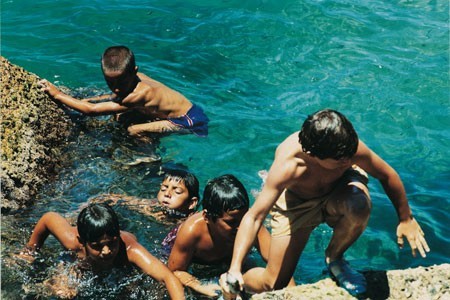
Why has Godard’s elegant yet botched attempt at a movie musical A Woman is a Woman been re-released theatrically? If anything, this intermittently amusing dry martini reinforces what we sadly know: that the bad movies of 42 years ago seem positively stellar compared to the trash on our screens today. Which doesn’t excuse Godard’s folly. As a cabaret chanteuse who spends a good deal of time flirting with Jean-Paul Belmondo, Anna Karina can barely carry a tune—although that scarcely matters with lyrics such as “I’m the girl who says yessirree/When a fella says c’mon sweetie.” The scenes of these frustrated lovers clowning around gay Paree have style and verve; the dreary domestic passages between the leading lady and Jean-Claude Brialy bring Woman to a halt. Godard chops most of the music in mid-note, lest we dare forget that we’re watching a movie. In the lone exception, our nutty auteur shoots a café sequence in real time: Karina and Belmondo lounge dejectedly as a jukebox spins Charles Aznavour’s bittersweet ballad “You’ve Let Yourself Go.” This lovely song captures a kind of magic that eludes Godard (and us) for the remaining 80-odd minutes.
September 2003
 It’s hard to hate entirely a film where a man and a woman listen to and talk about the great cabaret singer Blossom Dearie whilst en route to an adulterous tête-à-tête. Ms. Dearie’s fresh-as-yesterday 1957 recording “Try Your Wings” figures prominently in one of My Life Without Me’s less intolerable sequences; otherwise this brightly-colored treacle, which concerns a 23-year-old woman’s decision not to reveal her impending death to family, friends, and her extramarital lover, offers plenty to hate. Having watched a close relative of mine wither from the same disease, I was loath to see ovarian cancer used as grist in what amounts to a postmodern deodorant commercial about death. Tasteless as the premise is, the sociopathic reactionaries at the promo screening I attended could not stifle their giggles and guffaws when the woman’s doctor tells her, “There’s nothing we can do.” Among the cast, bearded Mark Ruffalo makes a sympathetic chump for the dying seductress, and Leonor Watling has a riveting cameo as a nurse with a nightmarish tale to tell. In the insufferably manipulative lead role, Sarah Polley, who was outstanding in The Sweet Hereafter and has done nothing of that caliber since, is as clammy as paste.
It’s hard to hate entirely a film where a man and a woman listen to and talk about the great cabaret singer Blossom Dearie whilst en route to an adulterous tête-à-tête. Ms. Dearie’s fresh-as-yesterday 1957 recording “Try Your Wings” figures prominently in one of My Life Without Me’s less intolerable sequences; otherwise this brightly-colored treacle, which concerns a 23-year-old woman’s decision not to reveal her impending death to family, friends, and her extramarital lover, offers plenty to hate. Having watched a close relative of mine wither from the same disease, I was loath to see ovarian cancer used as grist in what amounts to a postmodern deodorant commercial about death. Tasteless as the premise is, the sociopathic reactionaries at the promo screening I attended could not stifle their giggles and guffaws when the woman’s doctor tells her, “There’s nothing we can do.” Among the cast, bearded Mark Ruffalo makes a sympathetic chump for the dying seductress, and Leonor Watling has a riveting cameo as a nurse with a nightmarish tale to tell. In the insufferably manipulative lead role, Sarah Polley, who was outstanding in The Sweet Hereafter and has done nothing of that caliber since, is as clammy as paste.
October 2003

Pedophiles might want to take a gander at Respiro. Shot under the blazing sun of a Mediterranean isle, the film concerns itself with rival gangs of bronzed brown ragazzi who take turns stripping off one another’s underwear. And there isn’t an ugly child in the bunch—heavens, no! One photogenic little Adonis after the next scurries over jagged rocks and baked earth, their tender young backsides on prominent display.
What’s up with this? The press would have us believe that Respiro portrays a woman who longs for freedom outside her stifling domestic commitments. Yet the mother acted out by Valeria Golino isn’t a character; she’s a generic free spirit, a compendium of every movie cliché about lusty, earthy Italian women. She gestures frenetically, so that we’ll know how she fights to be “free,” and in one scene she comes casually close to incest with her son. She evinces, certainly, more affection for the boy, who looks barely 13, than for her gruff fisherman husband.
The director sometimes whips up nice touches. When there are underwater sequences, the soundtrack swells with the watery, spaced-out purity of the British baritone saxophonist John Surman. In the culminating frames, most of the cast plunges into the sea for an ensemble dunk, and the camera rests a while on lower limbs thrashing about; it’s as if the villagers had morphed into mermaids and were waving goodbye with their tails. – NPT
June 2003

You must be logged in to post a comment.